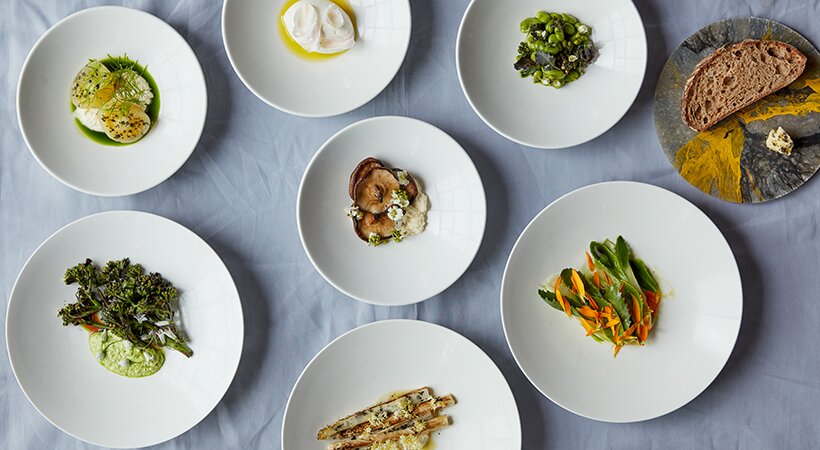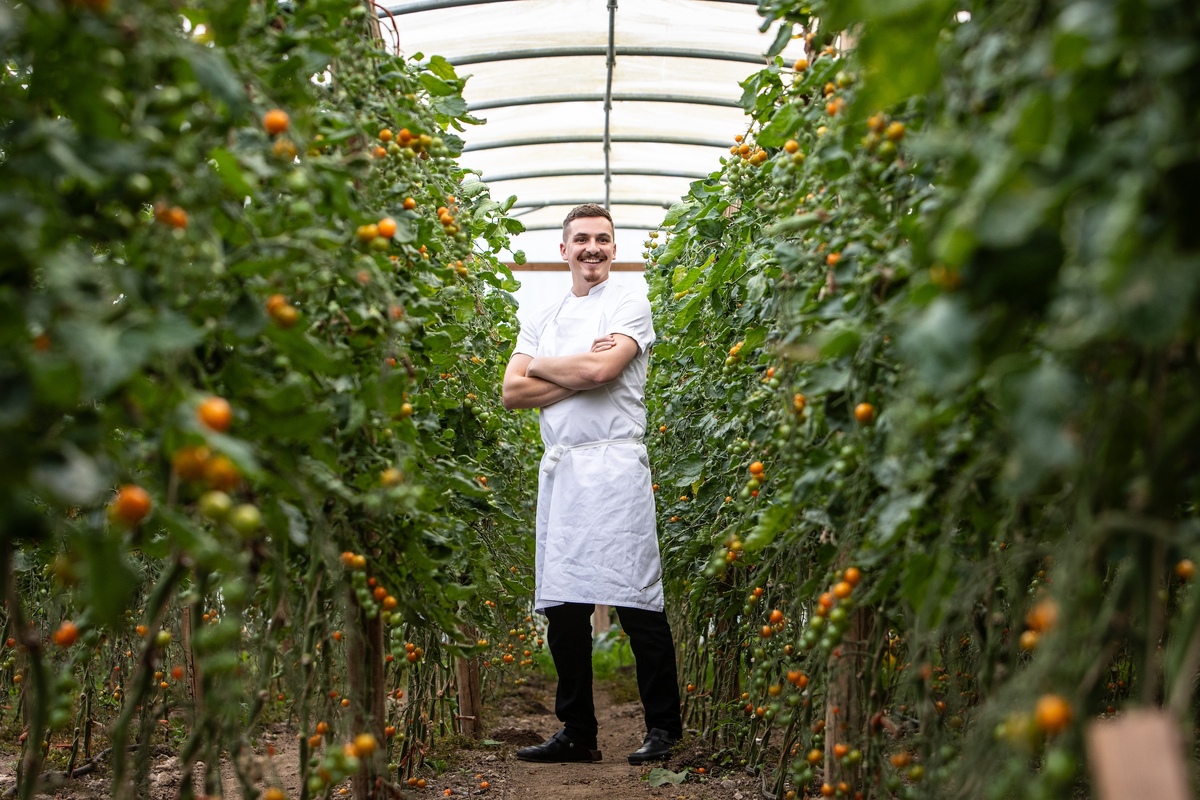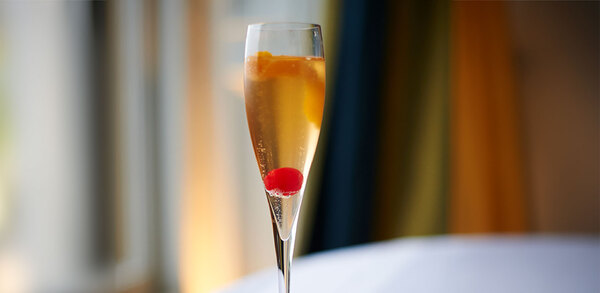Reviews: Silo, Dulwich Lyceum and more
The Guardian’s Grace Dent finds zero-waste Silo in London’s Hackney Wick laudable but ‘po-faced’
With every course, a server arrives, calls you “folks”, kneels down, proffers a tiny sliver of radish with a small fart of hemp cheese goo inside, before talking you through the lifespan of the radish and the seasonings and the puddle of glop in which it sits and all the minuscule stages of its cooking process, plus the flavour notes of which you need to be aware. If you’re in the mood for this kind of thing, you’ll love the place.
Two charred artichokes – and by charred, I mean they resembled something you’d find in the remains of your house after a fire – sit in a Stichelton cheese sauce with a vividly red ruby kraut. They’ve been caramelised over fire before being plunged into coals to get that blackened exterior. The small amount of flesh inside is sweet and fudgy, but the skin is bitter and tastes, unsurprisingly, of fire. The small piece of braised Friesian bull is delivered with a soliloquy on its various life stages, its noble death, and the machine Doug owns that turns an unappetising cut into something edible. It’s a piece of meat extracted from between the ribs, and comes from a wing of the dairy industry that’s not usually consumed – enjoy the course. A tiny suggestion of pumpkin ice-cream is, however, delicious.
Price: Dinner £50 a head six-course tasting menu only; brunch from £7.50 a plate. Rating: food 3/10; atmosphere 3/10; service 3/10
The devil is in the detail at Dulwich Lyceum in London, Fay Maschler writes in the Evening Standard
White tarama, so much better than that usual knicker-pink purée, reclining smoothly in a puddle of olive oil is topped with fresh roe and also powdered bottarga (dried roe). Shards of filo pastry deep-fried to multi-layered crispness separate it from a salad of shaved fennel with red grapes.
Parcels of dough for the little dumplings called manti are twirled as expertly as for dim sum, filled with the sweet meat from lamb neck mixed with pine nuts and dressed with yogurt, herbs, chilli flakes and pul biber butter — coloured and flavoured with Aleppo pepper. Bakaliaros, salt cod fritters traditionally served to celebrate Greek Independence and The Annunciation — Evangelismos — of Virgin Mary are accompanied, as ordained, by skordalia (garlic mash) and also jewel-like ruby red marinated beetroot, walnuts and capers.
Cornish monkfish with graviera avgolemono, egg and lemon sauce incorporating the nutty flavour of the second most popular (after feta) cheese in Greece, moves my companion later to write that cheese should be used more often in fish dishes, though not in fish pie. Alongside comes a herb salad spiked with keta (salmon) caviar.
A version of pastilla, the Moroccan filo pastry pie, is made with rabbit, apricots and almonds rolled into cornets served with roasted celeriac and a soft-boiled egg with seed coating — meticulous detail and dexterity.
Rating: 4/5
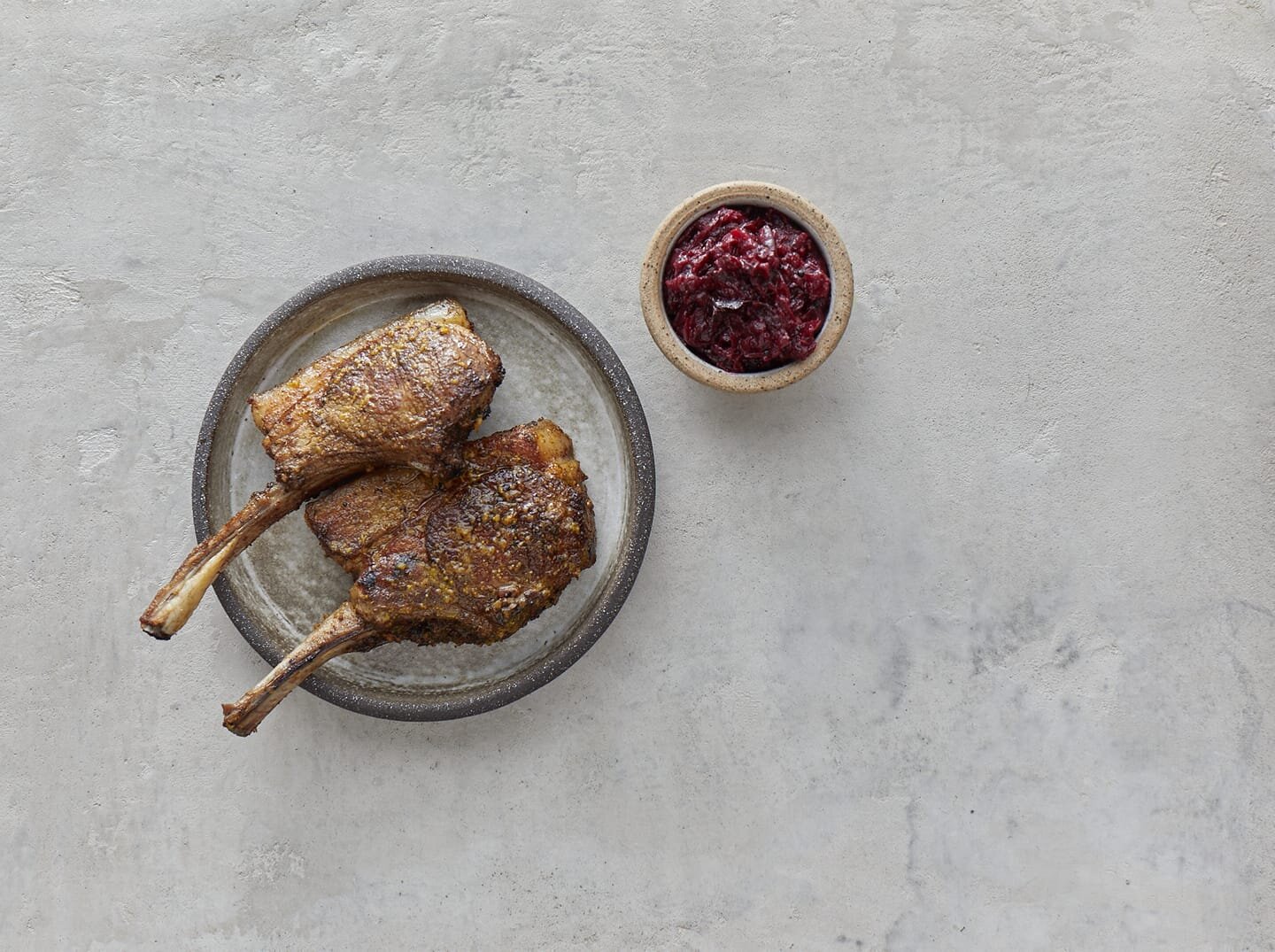
The food at Paradise in London’s Soho is divine, according to The Times’ Marina O’Loughlin
Mutton rolls, those stalwarts of the traditional “short eats” — a kind of cross between street food and afternoon tea — were the best I’d eaten, the spicing multilayered and resonant, the shoulder meat-stuffed rolls substantial but a million miles away from some of the oafish bruisers sold in the name of Sri Lanka’s favourite log-shaped snacks. Two of them, plus an electrifying fermented chilli ketchup adding a touch of Heinz-via-Hades heat — £5.50…
Paradise is doing what it does with real care and love. Throughout, the quality of ingredients is striking. We’re told it uses fine British ingredients: that mutton, or seafood from dayboats, or spoonable “Highland pork” cheeks starring in curry of such thrilling complexity, dark with Lion Stout and heady with lemongrass, that I’m thinking about it days later and resenting the fact I had to share any of it.
Even incidentals are notable: the inevitable pol (chilli and coconut) sambol and the seeni (onion) sambol aren’t just afterthoughts, the coconut with the cool, sweet tenderness of the freshly grated, the onions jammy and fiery and reeking with the thrumming bass note of what is, perhaps, smoked, dried fish powder, umbalakada.
Price: For four, including 12.5% service charge £157
The Mail on Sunday’s Tom Parker Bowles enjoys the experience at Sushi Masa in London’s Willesden Green, but is slightly traumatised by a bone in his yellowtail
There are excellent home-made pickles, crisp and clean, and cold monkfish liver, riotously rich, in a sharp ponzu broth. Zaru soba noodles, a classic chilled summer dish, is every bit as cool and refreshing in mid-January as it is in the dog days of late July.
The dipping sauce, dotted with tempura bits and spring onion, is exemplary. Chicken yakitori is fatty, as it should be, but lacks the charcoal’s char. While rock shrimp tempura with the spicy, mayonnaise dipping sauce is a respectable version of the Nobu classic.
Another Nobu favourite, yellowtail with jalapeno, is less exciting. The fish is fresh enough, but not quite as neatly cut as it should be. A touch ragged. And the chillies have all the kick of a limbless mule.
O Toro sashimi, cut from the fattiest part of the tuna belly, is decent, but lacks the sublime sweetness of the very best. Far worse, I find a small but insistent bone in a fresh but unlovingly cut piece of yellowtail. The horror!
Service is swift and sweet, the sake list interesting. And the non-raw fish dishes as good as they always were. The sushi counter may have had an off day. We all do. But a bone in the yellowtail is the cardinal sashimi sin.
Price: About £40 a head. Rating: 3/5
Meanwhile, Silo’s ‘unblinking, contagious zeal is part of its incendiary charm’, writes Jimi Famurewa in the Evening Standard
Highlights came in the form of ‘badger flame beets’ — cold, sweet and apricot-hued with cow’s curd and a verdant moat of bay leaf oil — plus fore rib of mature bull, delivered from the vast open kitchen by McMaster himself, the sort of humble, Britpop-haired god-king who is also a waiter. It was slow-braised into otherworldly, flaking ribbons that even my lapsed vegetarian, steak-phobic wife couldn’t resist jabbing a fork towards.
And then there was the coal-roasted Jerusalem artichoke with Stilton-like Stichelton sauce: a rushing collision of smoke, fluffed sweetness and ripe tang like the narcotic pleasure hit of God’s own cheesy baked potato. The things in my wine-fogged memory that didn’t work as well featured process-heavy flourishes, such as a confrontationally vigorous sage and squash seed pesto, where the pursuit of zero-waste cleverness seemed to crowd out common-sense restraint. Plus the puddings — minimally sweet, accessorised ice creams made, respectively, from squash and linseed — were more like challenging, hair-shirted experiments than sinful doses of exuberance.
Rating: ambience: 5/5, food: 4/5
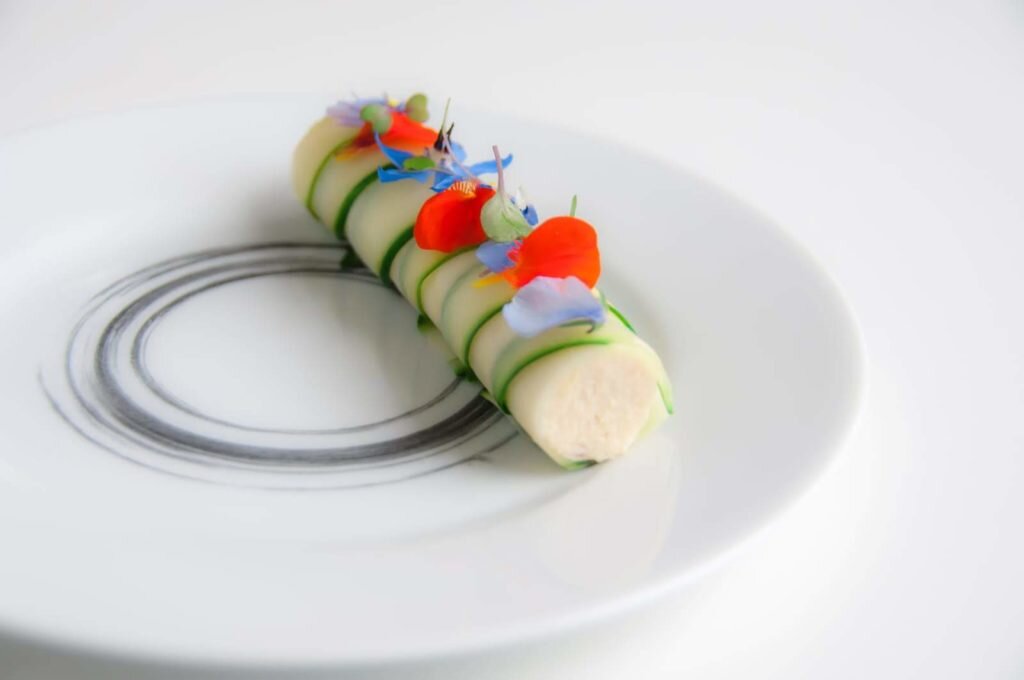
The Observer’s Jay Rayner says the plates at Edinburgh’s Merienda are ‘good in parts’
There is a crisp friable disc of filo pastry, piled with lubricated white crabmeat, topped in turn with a full Ker-Plunk of green apple batons, in a puddle of brisk acidic dressing. Of course, being tiny, it’s gone quickly. We miss it because it is sweet and salty and crisp and crunchy. Finely dicing up pear and walnut does not make them into a tartare. That’s a word applied to something served raw when normally it would be cooked. But slathering them in a Roquefort dressing does make it punchy and amusing. We adore a sizable chunk of duck breast, served pink, with a pile of fresh fava beans and loads of crisped chorizo, all bound together by a glossy jus. The roast squash with a few croutons is a nice enough side dish. At the end there is a well-roasted pear with splodges of salt caramel, and a few kernels of caramel popcorn as if someone had left a bag of Butterkist open, and it was felt better to use it.
Other things just missed the point, baffled us or weren’t very nice. “Bean purée with parsley pesto and powdered porcini mushroom”, sounds both rugged and flashily modern at the same time. But nice words are not the same as nice things to eat. It is just a bit gritty and salty. So too, the “nage poached Hebridean salmon, potato, dill, carrot cream” in which the fish has been so overpoached and so grossly underseasoned that you couldn’t help wishing the poor animal had been left to live out its days back in the Hebrides. It is the dull salmon dish at the summer wedding you didn’t really want to attend in the first place.
Price: all savoury dishes £5.90-£9.50, desserts £7, wines from £26
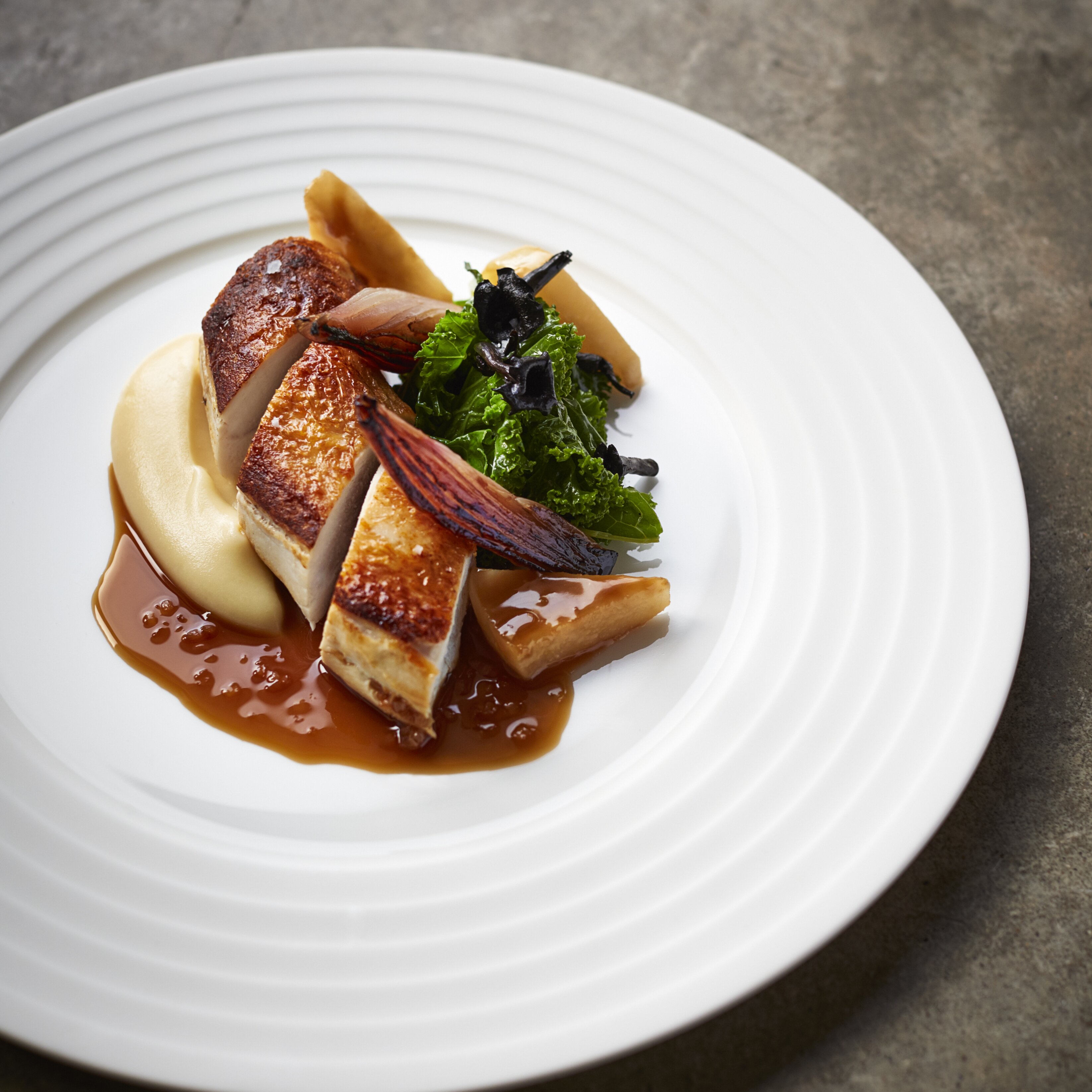
The Telegraph's William Sitwell says you cannot fault Jonny Lake’s cooking at Trivet in London’s Bermondsey – if you can afford it
The pair have created a beautiful restaurant of cloudy beige walls, indented shelves bearing antique pots, kettles and scales and oak panelling that sneaks round into the open kitchen and lends the pass the feel of a £50 million Chelsea kitchen. Which is a very nice feel, by the way.
The modest menu – five choices each of starter and main course – contrasts well with a Gutenberg Bible of a wine list – from which I picked a favourite Greek white – a glass of impeccable Assyrtiko from the Tselepos winery on the island of Santorini. This soothed me into a first course – more a canapé in terms of quantity – of a thing called a ‘sour cream and onion puffini’. This is a sort of collapsible panini, in that it looks like a panini and it collapses as you pick it up. I did love it, though, with its salty bits of caviar, and a dip of frothy sabayon custard.
Then I was tempted by the simple intrigue promised by a plate of ‘chicken with a vinegar sauce’. It was quite the most perfect dish of chicken eaten away from my kitchen that I can imagine. Soft and flavourful, with crisp skin and the most sublime mashed potato, along with kale, charred shallots and little bites of turnip. A chicken, potato and kale dish for £29? That’s right: the glorious results of gentrification and the audacious ambition of chefs.
Price: Lunch for two: £102.50 excluding drinks and service. Rating: 4/5
HOTELS

Fiona Duncan of the Telegraph says chef Robin Gill is the making of the newly launched Great Scotland Yard hotel, which she otherwise finds ‘somewhat contrived’
Contrived. That’s the first word that bubbles into my mind about this spanking new luxury hotel just off Whitehall. It’s not the only word – there are others more flattering, but it’s one I associate with so many new places these days...
Perhaps you aren’t looking for soul, or don’t think you are. If it’s a slick new bolt-hole you are after, one with the cachet of a famous name, then Great Scotland Yard will probably do very nicely. That you will fall in love with it, I doubt.
The entire ground floor is given over to food and drink and overseen by the delightful chef Robin Gill, whose hit restaurant, the Dairy, is around the corner from my flat in Clapham. The chance to have a presence in central London was a golden opportunity for Robin, and he has grabbed it with gusto.
He oversees, with Alex Harper (the Ledbury, the Harwood Arms), the entire food operation of the hotel. It includes his rustic, the Dairy-like farm-to-table restaurant, the Yard, with an attractively tiled open kitchen where an excellent breakfast is also served; his take on afternoon tea, served in an exotic lounge based on the Imperial Hotel in Delhi; and, hidden behind a secret door, Sibin, an inviting whisky den overseen by top bartender Michal Maziarz.
It’s back to contrived themes for the disappointing bedrooms… carpet that integrates, I’m told, badges and police uniforms in the design; police-blue veneered nightstands and so on. I was in a Lewis Suite, but there was nothing to justify the word 'suite' in what was a rather small bedroom with a fancy Japanese loo but a narrow shower. Only eight of the 152 rooms have baths. At a price tag of £600 a night, excluding breakfast, I expect a bath.
Rating: 7/10. Price: Double rooms cost from £460 per night, including breakfast



